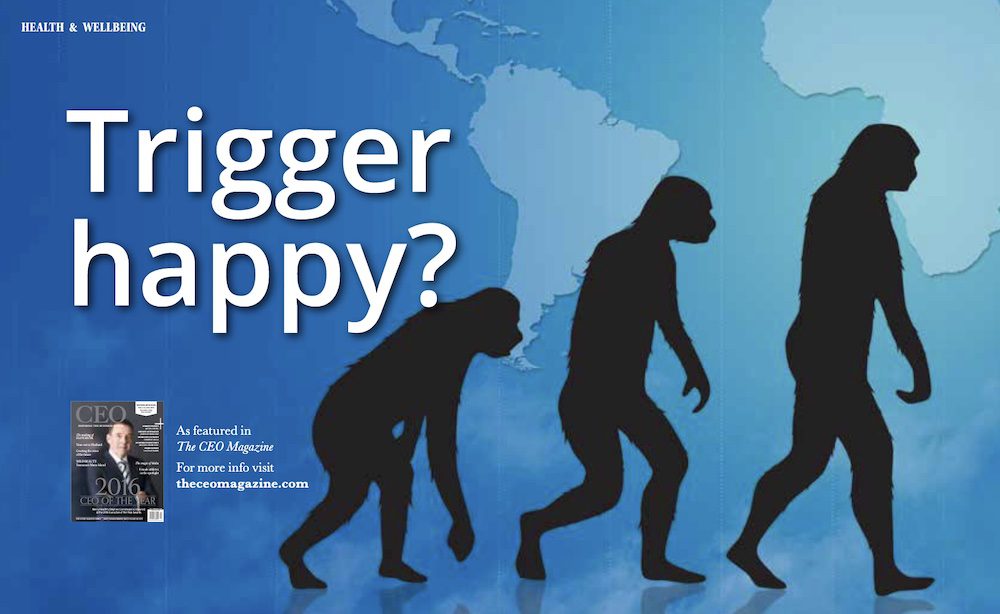Science tells us that life has been evolving for a billion years, and that this biological story is within each of us. Until you understand the impact this inherited physiology has on people, you will never truly understand their behavior. The place to start learning is yourself.
Bacteria have been part of life from the beginning, with science suggesting that complex life developed after bacteria fused with single cells. The ensuing symbiotic relationship between bacteria and host has underpinned life ever since.
You have about the same quantity of bacteria cells in you as human cells (A Abbott 2016). The impact that your gut microbiology has on your mental performance is only just being understood. Over ninety percent of serotonin, a neurotransmitter is produced in the gut. The digestive system’s main nerve, the vegas, has a direct link to your brain with ninety percent of the information going gut to brain not the other way around (E Mayer 2010).
Research has shown that changing an animal’s gut bacteria can lead it to go from timid and shy, to bold and adventurous. (Bercik 2011). Perhaps in the future you will be tweaking your team’s gut microbiology to optimize personalities for results.
Your biological history contains about six hundred million years worth of reptilian evolution. This ancient part of your brainstem has being hardwired to activate a fight or flight reaction to any threat, real or imaginary. For evolutionary success, it was better safe than sorry. It was the paranoid that survived. This triggering of the sympathetic response system is also known as stress.
Stress is a whole-body response involving the release of hormones, shutting down of non-essential neural circuits, reduction in the brain’s ability to lay down new cells in the hippocampus and degrading of the immune system. This is not a state that leads to good cognitive decision-making.
It is not only a sabre tooth tiger that can trigger stress but also having too many emails, being spoken to with a slightly rude tone or most common of all, having negative or anxious thoughts.
Any executive under pressure must have the ability to self regulate through deliberately invoking a parasympathetic response. This induces a state when new neurons can be created and the frontal cerebral cortex is fully activated. To do this, one must first have noticed the stress activation and this is a skill that can be mastered through self-awareness of the body and its emotions.
Your biological history contains sixty million years of mammalian evolution when your limbic brain evolved to use memories and emotions to create habits. All mammals are habitual creatures and we should not underestimate the power that conditioning has on our behavior.
Our limbic system is basically a playback-record device that remembers actions that were tagged with a positive emotion and tries to repeat them whilst avoiding behaviors that were tagged with a negative emotion. There is no space in the limbic system for actually contemplating whether repeating the same behavior over and over again is actually beneficial. You need your best people thinking in original ideas not ideas received through internal or external conditioning,
Your biological history contains about two hundred thousand years of homo-sapien evolution. We’re a recent iteration of life that are each born with what has worked best for the past fifty thousand generations, not the past five thousand and certainly not the past five.
The human evolutionary leap seems to be the brain’s neo-cortex, the part responsible for language and abstract thought. The frontal cerebral cortex can override the more primitive parts of your brain and decide that you having two-hundred emails to deal with in fifteen minutes is not a reason to trigger a huge rush of cortisol around your body in the activation of the primitive sympathetic response. Doing this is called a cortical override. This is self-management of the stress response. This ability can be trained through mindfulness and meditation exercises. Harvard research shows that actual brain tissue growth can be measured in just eight weeks of practice (Lazar 2011 et al).
Your biological history plays a large part in your story, whether you like it or not. By understanding the influence of one billion years of evolution, you can better identify inherited tendencies for what they often are, remnants of an earlier life. It’s possible to make conscious frontal cortex decisions that over-ride unhelpful patterns that might have served a mammal on the savanna well but don’t serve you so well any more. How evolved do you want to be?
Paul von Bergen

